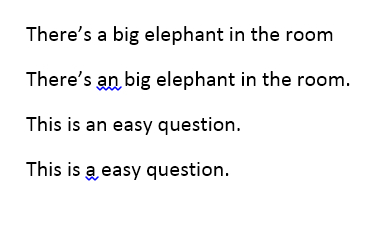This is NOT a request for a recommendation of a "best" book. I'm looking for a definitive authoritative source to address a specific question...
I recently had a discussion with a friend of mine who is a retired high-school English teacher. We were discussing the correct usage of "a" vs "an".
In her opinion the article must always match the subject. Thus she says "an emergency" is correct but so is "an dire emergency", she claims.
I personally think she is wrong, that the correct usage of the indefinite article is never based on the subject per se but rather only on the vocal pronunciation of the most proximate word following the article.
Any suggestions for a source that would generally be well-respected by school teachers?

